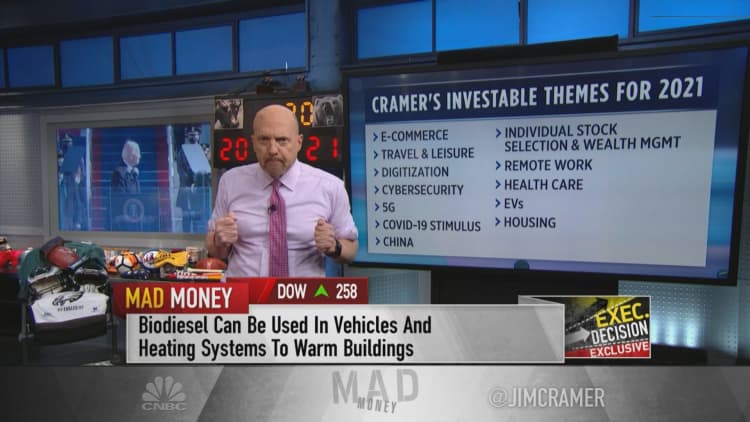Tesla's rise last year to become the world's most valued automaker by market cap is drawing investors to electric vehicle start-ups and even drawing money to established automakers such as General Motors as it shifts to EVs.
Such stocks could become even more attractive to Wall Street under President Joe Biden, who has made climate change a priority of his administration. That includes giving consumers incentives to adopt EVs, which use electricity instead of gasoline and produce zero emissions that are harmful to the environment.
"Post the election of Joe Biden as President of the United States, we believe the US EV narrative will see a step forward — the US has been a laggard in EV uptake vs. Europe and China until now, and Mr. Biden is expected to take actions driving uptake of EV," Credit Suisse's Dan Levy wrote to investors following Biden's election.
Biden wasted little time in moving forward with several campaign promises during his first hours as president. Following his inauguration Wednesday morning, Biden rejoined the Paris agreement on climate change and directed federal agencies to consider revising vehicle-fuel emissions standards that were cut by the Trump administration.
Here's what Biden plans that could boost EV sales, and stock prices of those companies, in the U.S.:
CAFE
The federal fuel economy rules — formally known as the Corporate Average Fuel Economy, or CAFE, standards — were designed to push automakers to increase the fuel efficiency of their vehicles to reduce the country's dependency on fossil fuels.

Before President Donald Trump rolled back the standards set under the Obama administration, automakers were supposed to increase the fuel efficiency of their fleets by 5% annually from 2021 through 2026. The Trump administration rolled that back to 1.5%, meaning automakers would need to achieve a fleetwide average gas usage of 40.4 mpg instead of 46.7 mpg by 2026 under Obama's plan.
"Be ready for more stringent environmental regulations that push people into electronic vehicles," CNBC's Jim Cramer said on "Mad Money" on Wednesday.
During his campaign, Biden vowed to "establish ambitious fuel economy standards" and to negotiate them with environmental groups, automakers and other involved parties.
Reestablishing, increasing or even modernizing the previous standards to focus more on EVs could push automakers to more quickly transition to all-electric vehicles.
'Cash for clunkers'
Biden has said he is supportive of a "cash for clunkers" rebate program that would encourage Americans to trade in their older vehicles for new EVs.
A similar program was launched by the Obama administration to spur sales of new vehicles and stimulate the economy during the Great Recession in 2009. The Car Allowance Rebate System, or CARS, included a credit of up to $4,500 for Americans to trade in their older vehicles for newer, more fuel-efficient ones.
Tax credits
Consumers can currently get a federal tax credit of up to $7,500 on the purchase of an all-electric or plug-in hybrid electric vehicle, but not all cars are eligible. The incentive begins phasing out after an automaker sells 200,000 of its EVs.
Only Tesla and GM have hit that threshold so far. Both previously lobbied Congress to lift the cap or extend the existing tax credit.
As GM faced an expiration of its U.S. tax credits in 2018, the automaker outlined its own proposal for a national zero-emission vehicle program focused on accelerating EV adoption. The Detroit automaker anticipated its program could add more than 7 million electric vehicles to the road by 2030.
Part of Biden's clean energy push was to create or expand tax incentives for clean energy, including restoring the full federal tax credit for electric vehicle purchases. Unlike the current system, his plan said the new framework would be "designed to target middle-class consumers and, to the greatest extent possible, to prioritize the purchase of vehicles made in America."
"We also believe domestically a Biden Administration taking over in January will likely focus on possibly increasing consumer EV tax credits/incentives domestically, which could represent another catalyst in U.S. EV adoption beginning in 2021 with Tesla a key beneficiary," Wedbush's Dan Ives wrote in an investor note upon Biden's election.
The current system has been criticized for giving tax credits toward more expensive, high-end EVs whose owners could likely afford them without federal tax credits.
Infrastructure
Biden has promised $400 billion in public investment in clean energy, including battery technologies and electric vehicles. Part of that plan includes dedicating government spending to support electric vehicles, with 500,000 new electric vehicle charging outlets by the end of 2030.
The lack of that infrastructure, the cost to install it and slow EV charging times and range have all been cited as the largest hurdles for the ownership of electric vehicles for U.S. consumers.
The U.S. currently has less than 29,000 public EV chargers, according to the U.S. Department of Energy. That compares with more than 136,000 gas stations, according to fuel data company GasBuddy.
Stimulus
The U.S. government has long subsidized companies through loans and tax breaks to research and develop new or emerging technologies. Tesla, for example, borrowed $465 million under the Energy Department's Advanced Technology Vehicle Manufacturing program in January 2010.
An expansion of such programs could assist in further development of EVs for start-up companies such as Lordstown Motors and Fisker, which both went public last year.
BofA Global Research analyst John Murphy described government stimulus under Biden's Green New Deal as "one potential solution to the industry's EV capital conundrum."


